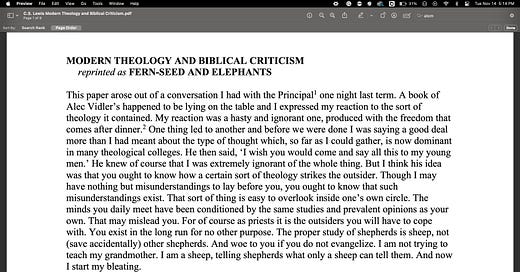The Common Error of Biblical Studies and Systematic Theology
How these two opposite fields are two sides of the same coin
Dear Reader,
As of right now, I am a Theology Major at college with a concentration in Philosophy and a concentration in Biblical Studies (also a minor in Literature). I have developed a seemingly ever-growing beef with the majority of the field of Biblical Studies.
One simple, but interesting, critique of Biblical Studies comes from C.S. Lewis. He writes in an essay entitled Modern Theology and Biblical Criticism:
I had published a book of essays; and the one into which I had put most of my heart, the one I really cared about and in which I discharged a keen enthusiasm, was on William Morris.7 And in almost the first review I was told that this was obviously the only one in the book in which I had felt no interest. Now don’t mistake. The critic was, I now believe, quite right in thinking it the worst essay in the book; at least everyone agreed with him. Where he was totally wrong was in his, imaginary history of the causes which produced its dullness.
Here Lewis describes how modern-day critics misunderstand his work. The critics look very closely at some small pieces of Lews’ essays and then draw enormous conclusions regarding them. This is the error of Biblical Studies: looking at one small text and neglecting of all the others. Instead of harmonizing, they attempt to divide and split.
On the other hand, though, is something I thought up a long time ago. What if one is reading Lewis and they pull a quote from one part of his essay and a quote from another one, and then they attempt to understand the meaning of both of these quotes together? What do you suppose they would end up with? Well, based on two quotes, they could end up with just about anything. They could make Lewis say something he never thought of. This, you see, is the error of systematic theology: pulling a tiny piece of text—often pulled out of its context—in order to compare that with another tiny text—also often pulled out of its context.
Biblical Studies and Systematic Theology are on two opposite ends of the same spectrum. The one focuses in too much, the other broadens out too much. What must be done? Quite obviously to read the text both in its context, but also in relation to other texts in the paragraph, chapter, book, canon, and tradition. You cannot just read Genesis chapter I in a vacuum; but nor can you claim doctrines without restraint while verse or half-verse citing every statement. Both are in error.
We must be both broad and tight. This is how to do proper Theology. But, of course, I am just a freshman undergraduate; and am therefore not taken very seriously. Do I sound disgruntled? That is another matter, however.
May God have mercy on me and my efforts and also on you. Thanks for reading.
Your exasperated college student,
CJK




Have you encountered any good examples of a good kind of synthetic study you advocate for here?
It seems to me that this kind of synthesis requires minds so huge that this kind of cutting becomes necessary just to do anything. Clay Libolt often asks where our generation's "great" theologian is. Barth was probably our last one. Who will rise above the 21st century's academic atomism?